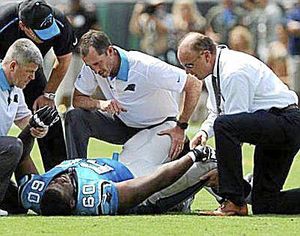Faced with one of those life-altering choices, Patrick Connor could have never foreseen that 30 years later, his fateful decision would put him on the sideline for Super Bowl 50.
But Sunday, when the Carolina Panthers tangle with the Denver Broncos in the NFL’s 50th Big Game, it will be Connor — a Bartlesville native, a Tulsa Golden Hurricane, an Oklahoma State Cowboy and an Oklahoma Sooner (sort of) — who will tend to the road team’s health and well-being.
Connor, 52, was once a tennis prodigy, but now he’s head physician for the Panthers.
It was back in 1986, after Connor graduated from Oklahoma State (he had just won a Big Eight Conference championship and was among the NCAA’s top 10 as a senior) that he found himself weighing two massive options.
One was to pursue a career in professional tennis.
The other was to pursue a career in medicine.
“I was at the proverbial fork in the road of life,” Connor told the Tulsa World this week, “and I decided to go to medical school and started my new path.”
At Bartlesville, Connor became Oklahoma’s first four-time state singles champion, winning No. 2 singles in 1978 and ’79 (big brother Jim played No. 1) and then winning No. 1 singles in 1980 and ’81.
“Tennis,” he said, “was my life.”
Connor, the third of four children of former Oklahoma House of Representatives Minority Floor Leader Jim Connor, began playing tennis at age 3, was participating in national tournaments at age 10, and was ranked No. 1 in Oklahoma in his age group for most of his career on the junior circuit.
He turned down several scholarship offers (Notre Dame and Ohio State, among them) to play doubles at Tulsa with big brother Jim for two years, then transferred to OSU.
After college, he faced the big choice.
He attended OU College of Medicine in Oklahoma City from 1986-90, then moved to Charlotte, North Carolina, for his residency in orthopedic surgery. He followed that up with fellowships at Columbia University in New York and at the Mayo Clinic, became proficient at elbow and shoulder surgery, then returned to Charlotte to start his own practice in 1996.
The year before, the NFL expanded and a brand new outfit had moved into North Carolina: the Panthers. When Connor came back in ’96, the team’s head physician at the time asked if he’d like to be his assistant. He figured, why not?
“I really had no passion or desire or goal to be a team doctor,” he said. “For gosh sakes, growing up in Oklahoma, our NFL team was the Sooners. So I was not real passionate about the NFL, frankly, but I did it just because I was asked to do it and I was a junior partner. So I became the assistant team physician back in the spring of 1997.”
In 2001 he was promoted to head team physician. For 19 years now, every game, home and away, he has stood vigil on the Carolina sideline, taking care of the wounded and making lasting relationships.
This year’s Panthers posted an NFL-best 15-1 regular-season record. But Connor painfully recalls his first year in charge, 2001, when Carolina went 1-15.
“It was really miserable,” he said. “Not only did the team not do well, but any time you go 1-15, you’re gonna have a lot of injuries. … So it was a hard year. But we’ve had our highs and lows, and this year obviously has been a fun run.”
This is the Panthers’ second Super Bowl appearance. Connor and his team were on the edge of euphoria back in 2003, when Jake Delhomme led Carolina down the field against the New England defense and tied Super Bowl XXXVIII at 29-all with just 68 seconds left.
“Then Tom Brady did his thing and they kicked a field goal at the last minute,” Connor said. “It was an unbelievable gut-punch. It was really hard to see all that hard work (by the coaches and players) go away in such a short, quick, fleeting moment. It’s hard.”
Connor also is the team doctor for the Chicago White Sox Triple-A affiliate Charlotte Knights and for Joe Gibbs Racing (he sees more injuries in the pit crew than the drivers).
But there’s nothing like standing on the 30-yard line in an NFL stadium every Sunday in autumn.
“Most people become team physicians, I think, by really having a passion to do it and really guiding themselves to it. Or, it just kind of happened,” Connor said. “With me, it just kind of happened.”
